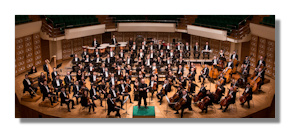
The Internet's Premier Classical Music Source
Related Links
- Latest Reviews
- More Reviews
-
By Composer
-
Collections
DVD & Blu-ray
Books
Concert Reviews
Articles/Interviews
Software
Audio
Search Amazon
Recommended Links
Site News
 Concert Review
Concert Review
Richard Wagner

Götterdämmerung
- Brünnhilde - Gun-Brit Barkmin
- Hagen - Eric Halfvarson
- Gutrune - Amanda Majeski
- Waltraute - Michelle DeYoung
- First Norn - Sarah Castle
- Third Norn - Jenufa Gleich
- Woglinde - Eri Nakamura
- Wellgunde - Aurhelia Varak
- Flosshilde - Hermine Haselböck
Bamberg Symphony Chorus
State Choir Latvija
Hong Kong Philharmonic Orchestra & Chorus/Jaap van Zweden
Hong Kong Cultural Centre Concert Hall 21 January 2018
After four seasons, the much-acclaimed concert Ring cycle of the Hong Kong Philharmonic Orchestra came to a triumphant conclusion with two performances of Götterdämmerung at the Cultural Centre Concert Hall. It is nothing short of a wonder that music director Jaap van Zweden has, within a few years, transformed the Philharmonic into a Wagnerian orchestra to be reckoned with, whose lush sound and technical finesse, not to mention the musicians' fierce sense of dedication, were again very much in evidence in this second performance on January 21, even though the overall playing, though still very impressive, did not quite reach the exalted level attained in last year's Siegfried. While van Zweden may not be the most individual interpreter of this music, his pacing was unerringly right, with orchestral balances perfectly calibrated and the architecture of the music firmly within his command. It was a magisterial rendition that faithfully revealed Wagner's score in all its glory.
Consistency in casting was not a top priority for this project, so that over the years we have been treated to three different singers for the role of Brünnhilde and two for Siegfried. Nevertheless, the overall standard of singing has been high, and there were some interesting casting choices along the way, with Matthias Goerne's Wotan/Wanderer immediately coming to mind. Götterdämmerung featured a mostly new team of singers. In a notable role debut, Gun-Brit Barkmin gave an intelligent and deeply committed performance of Brünnhilde, conquering the role's formidable difficulties with her athletic and resilient soprano, and she capped it all with a blazing Immolation. Although her interpretation would surely deepen with time and experience, it was in all respects a splendid assumption by a singer whose voice is in full bloom. Singing with uncommon lyricism, Daniel Brenna offered a dramatically incisive reading of the part of Siegfried, making clever use of the text to shape his vocal lines. While this may not be a very heroic conception in the traditional vein, it was undoubtedly a sympathetic one from a musical point of view, which underscored the tragedy that befell a fearless but naïve man when he was confronted with a world full of subterfuge.
Eric Halfvarson's darkly intense Hagen was thrillingly enacted, and despite his having apparently caught a cold, he did not spare his voice. Shenyang presented an unusually aristocratic Gunther with his mellifluous bass-baritone, and although the part of Gutrune does not provide a lot of vocal opportunities for the soprano, Amanda Majeski's silver-toned Gutrune sounded more than respectable in this assignment. Michelle DeYoung (the Fricka in the earlier operas) made much of the mini-drama in Waltraute's narration with her plush mezzo whereas Peter Kálmán delivered Alberich's urgings with quiet eagerness.
With her clarion voice and noble delivery, Stephanie Houtzeel's Second Norn stood out in a solid trio that also included Sarah Castle and Jenufa Gleich, even if they were at times hard-pressed by the orchestra at full throttle. Making a welcome return after the 2015 Rheingold, Eri Nakamura, Aurhelia Varak and Hermine Haselböck were the sublime Rhinemaidens, whose voices blended most beautifully. Coached by Eberhard Friedrich, chorus master of the Bayreuth Festival, the combined forces of the Hong Kong Philharmonic Chorus, the Bamberg Symphony Chorus and the State Choir Latvija made a mighty sound and sang with dramatic conviction. Their contribution in Act 2 was definitely one of the musical highlights of the evening.
At the end of this sensational performance, the attentive audience rose as one to greet the musicians with the sort of prolonged rapturous ovations rarely witnessed in Hong Kong. Happily, those Naxos engineers working behind the scenes have ensured that another successful recording will emerge later in the year to document the final instalment of a daring venture by van Zweden and his admirable orchestra, the artistic results of which have surpassed all expectations.
Copyright © 2018, Vincent H.K. Lau












